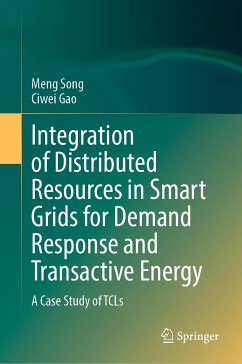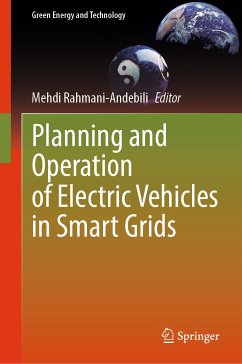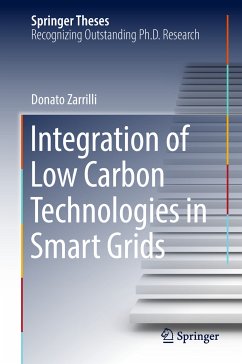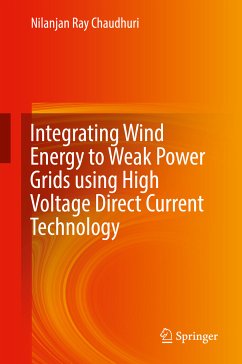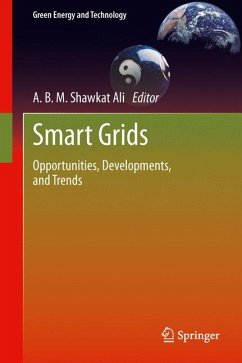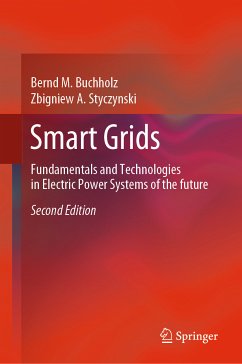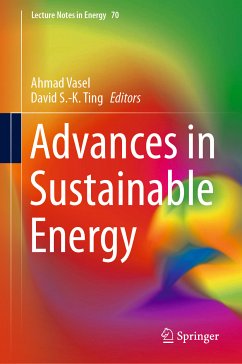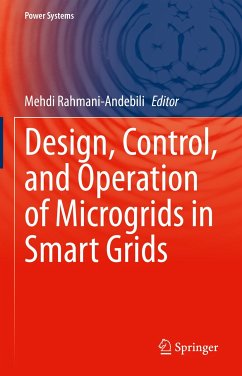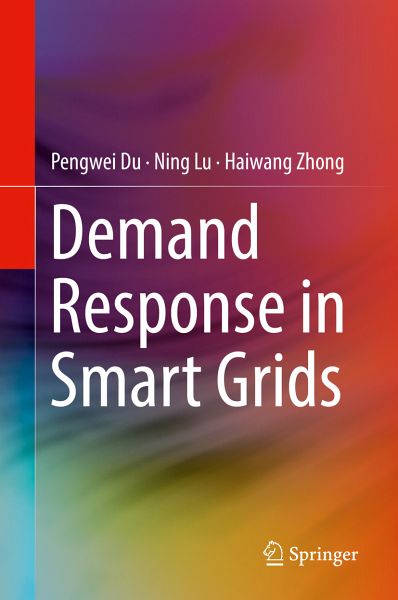
Demand Response in Smart Grids (eBook, PDF)

PAYBACK Punkte
52 °P sammeln!





Demand Response in Smart Grids (eBook, PDF)
Dieser Download kann aus rechtlichen Gründen nur mit Rechnungsadresse in A, B, BG, CY, CZ, D, DK, EW, E, FIN, F, GR, HR, H, IRL, I, LT, L, LR, M, NL, PL, P, R, S, SLO, SK ausgeliefert werden.
Dr. Pengwei Du is Lead Engineer-Renewable Integration with the Electric Reliability Council of Texas (ERCOT). Prior to this, he was a senior research engineer with Pacific Northwest National Laboratory (PNNL). Dr. Du has extensive experiences in simulation, modeling, protection and control of power systems, renewable energy integration, microgrid, and cyber security. He has been vice-chair for Bulk Power System Planning Subcommittee at IEEE Power & Energy Society since 2016. He is a subject editor of IET Generation Transmission & Distribution and an editor for IEEE Transactions on Power Systems. Dr. Du is the recipient of IEEE PES Power System Dynamic Performance Committee Best Paper Prize in 2016. He graduated from Rensselaer Polytechnic Institute with a Ph.D. in Electrical Engineering.
Dr. Lu is an Associate Professor at the ECE Department of North Carolina State University and has over 20 years of experience in electric power engineering. She receivedbachelor's degree from Harbin Institute of Technology in 1993 and Ph.D. degree from Rensselaer Polytechnic Institute in 2002. From1993 to1998, she was a power system design engineer with Shenyang Electric Power Bureau. From 2003 to 2012, Dr. Ning Lu was a senior research engineer with Pacific Northwest National Laboratory. Dr Lu's research interests include modeling and analysis of power system load behaviors, energy management systems development, renewable integration, microgrid modeling and control, and power system data analytics. Dr. Lu is a senior member of the Institute of Electrical and Electronics Engineers. She has authored or co-authored more than 100 publications, including journal articles, conference proceedings, and technical reports.
Dr. Haiwang Zhong received both the B.S. and Ph.D. degrees from the Department of Electrical Engineering, Tsinghua University in 2008 and 2013, respectively. Currently, he is an Associate Professor at Tsinghua University. His research interests include power system operations and planning, electricity markets and demand response. He developed the generation scheduling software that has been applied in 10+ provincial power dispatch centers in China. He currently serves as the Vice Chair of the IEEE PES WG on Demand Response, Secretary of the Architecture Subcommittee under the IEEE PES Smart Building and Load Control Committee. He serves as the Editor for International Transactions on Electrical Energy Systems, Journal of Modern Power System and Clean Energy, and CSEE Journal of Power and Energy Systems. He was awarded the ProSPER.Net Young Scientist Award. He was awarded 2 Provincial Awards. He won the Gold Medal in 44th Geneva International Invention Exhibition in 2016.
Dr. Lu is an Associate Professor at the ECE Department of North Carolina State University and has over 20 years of experience in electric power engineering. She receivedbachelor's degree from Harbin Institute of Technology in 1993 and Ph.D. degree from Rensselaer Polytechnic Institute in 2002. From1993 to1998, she was a power system design engineer with Shenyang Electric Power Bureau. From 2003 to 2012, Dr. Ning Lu was a senior research engineer with Pacific Northwest National Laboratory. Dr Lu's research interests include modeling and analysis of power system load behaviors, energy management systems development, renewable integration, microgrid modeling and control, and power system data analytics. Dr. Lu is a senior member of the Institute of Electrical and Electronics Engineers. She has authored or co-authored more than 100 publications, including journal articles, conference proceedings, and technical reports.
Dr. Haiwang Zhong received both the B.S. and Ph.D. degrees from the Department of Electrical Engineering, Tsinghua University in 2008 and 2013, respectively. Currently, he is an Associate Professor at Tsinghua University. His research interests include power system operations and planning, electricity markets and demand response. He developed the generation scheduling software that has been applied in 10+ provincial power dispatch centers in China. He currently serves as the Vice Chair of the IEEE PES WG on Demand Response, Secretary of the Architecture Subcommittee under the IEEE PES Smart Building and Load Control Committee. He serves as the Editor for International Transactions on Electrical Energy Systems, Journal of Modern Power System and Clean Energy, and CSEE Journal of Power and Energy Systems. He was awarded the ProSPER.Net Young Scientist Award. He was awarded 2 Provincial Awards. He won the Gold Medal in 44th Geneva International Invention Exhibition in 2016.
Produktdetails
- Verlag: Springer International Publishing
- Seitenzahl: 260
- Erscheinungstermin: 2. Juli 2019
- Englisch
- ISBN-13: 9783030197698
- Artikelnr.: 57088883
Für dieses Produkt wurde noch keine Bewertung abgegeben. Wir würden uns sehr freuen, wenn du die erste Bewertung schreibst!
Eine Bewertung schreiben
Eine Bewertung schreiben
Andere Kunden interessierten sich für


